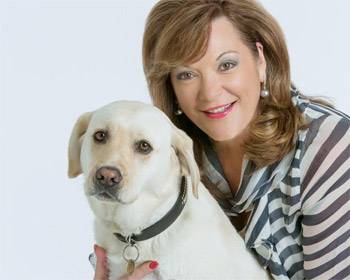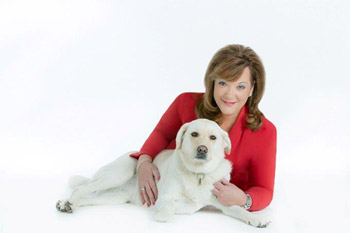Karen Hayes Take The Lead On International Guide Dog Day Interview

Karen Hayes Take The Lead On International Guide Dog Day Interview
Guide Dogs Australia has released alarming new research revealing that on average three guide dogs a month were attacked by a pet dog while working over the past year.
The findings, from a national survey of more than 230 Guide Dog handlers who are blind or vision impaired, reveal that some guide dogs were attacked multiple times - 32 respondents reported a combined 160 attacks on their Guide Dogs over the past three years, including one Guide Dog being attacked 15 times.
The survey found that one in four (27%) Guide Dogs attacked sustained injuries, with two Guide Dogs retired as a result of the trauma. Off-lead pet dogs were the cause for most of the attacks.
To address this issue, Guide Dogs Australia is launching a new public education campaign called Take the lead, calling on the country's dog owners to ensure their pet dogs are always walked on a lead in the name of responsible pet ownership.
'We're alarmed that so many Guide Dogs are being attacked by pet dogs and are appealing to dog owners to keep their pet dogs on leads when out and about," said Guide Dogs Victoria CEO, Karen Hayes.
'Guide Dogs play a vital role in enabling people who are blind or vision impaired to get around independently. Attacks compromise this independence and can cause serious injury and trauma to both the guide dog and its handler. In rare serious cases, attacks can result in premature retirement of a Guide Dog, which costs more than $30,000 to train.
'There's no doubt Australia is a nation of dog lovers with 4.2 million pet dogs across the country, but this just means 4.2 million potential safety hazards for Guide Dogs.
'We're encouraging dog owners to take the lead to help create a safe community not just for Guide Dogs and their handlers and but for everyone."
Other worrying results showed pet dogs distracting guide dogs from their job was a major safety concern for Guide Dog handlers, with the survey finding in the past year:
Eight out of 10 handlers said off-lead dogs had distracted their Guide Dogs while they were working
Seven out of 10 said dogs on leads but not controlled by their owner were problematic
Almost half of the Guide Dog handlers who said other dogs had distracted their Guide Dogs from their jobs, said they experienced it on a weekly basis, with one in seven saying distraction occurred daily
Both issues caused handlers anxiety and compromised their safety and confidence.
Celebrity vet (Channel 10's Bondi Vet) and dog owner, Dr Lisa Chimes has witnessed the trauma of dog attacks first-hand and is supporting the Take the lead campaign to remind the public about the importance of responsible dog ownership.
'I've had my own pet dog attacked by another dog, which was absolutely terrifying and I can't imagine how scary that would be for someone who is vision impaired," said Dr Chimes. 'And as a vet I've seen so many pet dogs injured from being attacked by other dogs that are off leads and out of control.
'It's our responsibility as pet owners to take control of our dogs and walk them on a lead because we need to make our community safe for our pets and for guide dogs."
High profile Guide Dog handler and Australia's Disability Discrimination Commissioner, Graeme Innes AM, knows too well the importance of being able to travel safely and efficiently.
Graeme has been blind all his life and currently works with his second Guide Dog, Arrow, to navigate his way around - whether it be across the city, interstate or overseas.
However, a common inhibitor to this is other dogs distracting Arrow from her job, which can make her anxious and put Graeme's independence and safety at risk.
'The trouble is, distraction is unexpected and it happens so fast. Those situations are very disruptive of my independence. I can't see the other dog so I don't know what we are dealing with and I can become scared for myself and my guide dog as it may put her and I in danger, especially if I'm about to cross the road," said Graeme.
Free dog leads featuring a tagline of -I'm taking the lead to support Guide Dogs' are being distributed in some states by local councils to new dog owners and in NSW and the ACT, guide dog handlers will hand them out to students at a series of school talks about the issue. The leads have been produced in partnership with Guide Dogs Australia's newly appointed national partner, pet care provider Joseph Lyddy.
For more information about the Take the lead campaign, including access to Guide Dog handler case studies, survey results and images please visit www.guidedogsaustralia.com.
The findings, from a national survey of more than 230 Guide Dog handlers who are blind or vision impaired, reveal that some guide dogs were attacked multiple times - 32 respondents reported a combined 160 attacks on their Guide Dogs over the past three years, including one Guide Dog being attacked 15 times.
The survey found that one in four (27%) Guide Dogs attacked sustained injuries, with two Guide Dogs retired as a result of the trauma. Off-lead pet dogs were the cause for most of the attacks.
To address this issue, Guide Dogs Australia is launching a new public education campaign called Take the lead, calling on the country's dog owners to ensure their pet dogs are always walked on a lead in the name of responsible pet ownership.
'We're alarmed that so many Guide Dogs are being attacked by pet dogs and are appealing to dog owners to keep their pet dogs on leads when out and about," said Guide Dogs Victoria CEO, Karen Hayes.
'Guide Dogs play a vital role in enabling people who are blind or vision impaired to get around independently. Attacks compromise this independence and can cause serious injury and trauma to both the guide dog and its handler. In rare serious cases, attacks can result in premature retirement of a Guide Dog, which costs more than $30,000 to train.
'There's no doubt Australia is a nation of dog lovers with 4.2 million pet dogs across the country, but this just means 4.2 million potential safety hazards for Guide Dogs.
'We're encouraging dog owners to take the lead to help create a safe community not just for Guide Dogs and their handlers and but for everyone."
Other worrying results showed pet dogs distracting guide dogs from their job was a major safety concern for Guide Dog handlers, with the survey finding in the past year:
Eight out of 10 handlers said off-lead dogs had distracted their Guide Dogs while they were working
Seven out of 10 said dogs on leads but not controlled by their owner were problematic
Almost half of the Guide Dog handlers who said other dogs had distracted their Guide Dogs from their jobs, said they experienced it on a weekly basis, with one in seven saying distraction occurred daily
Both issues caused handlers anxiety and compromised their safety and confidence.
Celebrity vet (Channel 10's Bondi Vet) and dog owner, Dr Lisa Chimes has witnessed the trauma of dog attacks first-hand and is supporting the Take the lead campaign to remind the public about the importance of responsible dog ownership.
'I've had my own pet dog attacked by another dog, which was absolutely terrifying and I can't imagine how scary that would be for someone who is vision impaired," said Dr Chimes. 'And as a vet I've seen so many pet dogs injured from being attacked by other dogs that are off leads and out of control.
'It's our responsibility as pet owners to take control of our dogs and walk them on a lead because we need to make our community safe for our pets and for guide dogs."
High profile Guide Dog handler and Australia's Disability Discrimination Commissioner, Graeme Innes AM, knows too well the importance of being able to travel safely and efficiently.
Graeme has been blind all his life and currently works with his second Guide Dog, Arrow, to navigate his way around - whether it be across the city, interstate or overseas.
However, a common inhibitor to this is other dogs distracting Arrow from her job, which can make her anxious and put Graeme's independence and safety at risk.
'The trouble is, distraction is unexpected and it happens so fast. Those situations are very disruptive of my independence. I can't see the other dog so I don't know what we are dealing with and I can become scared for myself and my guide dog as it may put her and I in danger, especially if I'm about to cross the road," said Graeme.
Free dog leads featuring a tagline of -I'm taking the lead to support Guide Dogs' are being distributed in some states by local councils to new dog owners and in NSW and the ACT, guide dog handlers will hand them out to students at a series of school talks about the issue. The leads have been produced in partnership with Guide Dogs Australia's newly appointed national partner, pet care provider Joseph Lyddy.
For more information about the Take the lead campaign, including access to Guide Dog handler case studies, survey results and images please visit www.guidedogsaustralia.com.
 Interview with Karen Hayes
Interview with Karen Hayes
Question: What is the Take the Lead campaign?
Karen Hayes: Take the Lead is a national public education campaign, calling on the country's dog owners to ensure their pet dogs are always walked on a lead in the name of responsible pet ownership.
Question: Why has the Take the Lead campaign been implemented?
Karen Hayes: Dog distraction is a very common issue for many of our Guide Dog handlers and the dogs themselves. A national survey of more than 230 Guide Dog handlers who are blind or vision impaired found that 40% of Guide Dog handlers said their dog had been attacked by another dog while it was working. 71% of these attacks on a Guide Dog were caused by an off-lead pet dog.
Attacks can cause serious injury and trauma to both the Guide Dog and its handler. In rare serious cases, attacks can result in premature retirement of a Guide Dog, which costs more than $30,000 to train.
This campaign encourages pet owners to take the lead to help create a safer community not just for Guide Dogs and their handlers, but for everyone.
Question: What do you hope Australians learn from this campaign?
Karen Hayes: We are a nation of pet lovers with over 4.2 million pet dogs across the country, which means 4.2 million potential safety hazards for Guide Dogs. We hope to remind Australians that Guide Dogs are in fact working and serving a very important purpose for vision impaired Australians. Simply keeping your own dog on a lead and under control in public places will go a long way to making life safer and easier for Guide Dog users.
Guide Dogs Australia has also released a national TV advertisement to help raise awareness of this issue, which can be viewed online here: http://youtu.be/SxSURp7Yi98
Question: Can you talk us through general guide dog etiquette?
Karen Hayes: While it might be a natural instinct to want to pat a Guide Dog, it can distract the dog from its most important job - helping their handler to travel safely and efficiently. When a Guide Dog is in their harness, it is a signal to them that play time is over and it's time to work. If you see a Guide Dog in their harness, it is important that you do not interact with them, or address them by name.
Question: Why do you believe these attacks are increasing (nearly half of these attacks occurred in the last 12 months)?
Karen Hayes: It comes down to awareness. We have over 4.5million dogs in Australia, and increasing. The vast majority of dog owners are responsible but many wouldn't think twice to let a well-trained dog off the lead in some public spaces. It's easy to forget that this can have an impact on Guide Dogs.
Question: How else are guide dogs affected by other off-lead dogs?
Karen Hayes: Even a friendly encounter with an off-lead pet dog can distract a Guide Dog, so even if you think your dog is harmless, you still need to keep them on a lead.
Distractions and provocations by people is another safety issue for Guide Dog users. 62% of Guide Dog handlers in Victoria indicated patting was the most concerning experience, occurring at least once a week. 60% of those Guide Dog users have changed their route of travel as a result of the distraction
Question: How else can Australians support Guide Dog Australia?
Karen Hayes: Guide Dogs Victoria only receives 8% of government funding for services other than Guide Dog mobility, meaning our other services are reliant on community donations exclusively. We also offer a puppy sponsorship program, where you can contribute to help raise and train a Guide Dog. In addition, we are always looking for enthusiastic volunteers to assist with a range of activities.
To find out more about donations and volunteering, visit www.guidedogsvictoria.com.au or www.guidedogsaustralia.com.au
Interview by Brooke Hunter
Karen Hayes: Take the Lead is a national public education campaign, calling on the country's dog owners to ensure their pet dogs are always walked on a lead in the name of responsible pet ownership.
Question: Why has the Take the Lead campaign been implemented?
Karen Hayes: Dog distraction is a very common issue for many of our Guide Dog handlers and the dogs themselves. A national survey of more than 230 Guide Dog handlers who are blind or vision impaired found that 40% of Guide Dog handlers said their dog had been attacked by another dog while it was working. 71% of these attacks on a Guide Dog were caused by an off-lead pet dog.
Attacks can cause serious injury and trauma to both the Guide Dog and its handler. In rare serious cases, attacks can result in premature retirement of a Guide Dog, which costs more than $30,000 to train.
This campaign encourages pet owners to take the lead to help create a safer community not just for Guide Dogs and their handlers, but for everyone.
Question: What do you hope Australians learn from this campaign?
Karen Hayes: We are a nation of pet lovers with over 4.2 million pet dogs across the country, which means 4.2 million potential safety hazards for Guide Dogs. We hope to remind Australians that Guide Dogs are in fact working and serving a very important purpose for vision impaired Australians. Simply keeping your own dog on a lead and under control in public places will go a long way to making life safer and easier for Guide Dog users.
Guide Dogs Australia has also released a national TV advertisement to help raise awareness of this issue, which can be viewed online here: http://youtu.be/SxSURp7Yi98
Question: Can you talk us through general guide dog etiquette?
Karen Hayes: While it might be a natural instinct to want to pat a Guide Dog, it can distract the dog from its most important job - helping their handler to travel safely and efficiently. When a Guide Dog is in their harness, it is a signal to them that play time is over and it's time to work. If you see a Guide Dog in their harness, it is important that you do not interact with them, or address them by name.
Question: Why do you believe these attacks are increasing (nearly half of these attacks occurred in the last 12 months)?
Karen Hayes: It comes down to awareness. We have over 4.5million dogs in Australia, and increasing. The vast majority of dog owners are responsible but many wouldn't think twice to let a well-trained dog off the lead in some public spaces. It's easy to forget that this can have an impact on Guide Dogs.
Question: How else are guide dogs affected by other off-lead dogs?
Karen Hayes: Even a friendly encounter with an off-lead pet dog can distract a Guide Dog, so even if you think your dog is harmless, you still need to keep them on a lead.
Distractions and provocations by people is another safety issue for Guide Dog users. 62% of Guide Dog handlers in Victoria indicated patting was the most concerning experience, occurring at least once a week. 60% of those Guide Dog users have changed their route of travel as a result of the distraction
Question: How else can Australians support Guide Dog Australia?
Karen Hayes: Guide Dogs Victoria only receives 8% of government funding for services other than Guide Dog mobility, meaning our other services are reliant on community donations exclusively. We also offer a puppy sponsorship program, where you can contribute to help raise and train a Guide Dog. In addition, we are always looking for enthusiastic volunteers to assist with a range of activities.
To find out more about donations and volunteering, visit www.guidedogsvictoria.com.au or www.guidedogsaustralia.com.au
Interview by Brooke Hunter
Have You Seen This?
MORE







